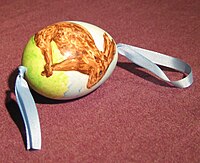Portal:Holidays
| Main page | Calendar | Categories |
Introduction

A holiday is a day or other period of time set aside for festivals or recreation. Public holidays are set by public authorities and vary by state or region. Religious holidays are set by religious organisations for their members and are often also observed as public holidays in religious majority countries. Some religious holidays, such as Christmas, have become secularised by part or all of those who observe them. In addition to secularisation, many holidays have become commercialised due to the growth of industry.
Holidays can be thematic, celebrating or commemorating particular groups, events, or ideas, or non-thematic, days of rest that do not have any particular meaning. In Commonwealth English, the term can refer to any period of rest from work, such as vacations or school holidays. In American English, "the holidays" typically refers to the period from Thanksgiving to New Year's (late November to January 1), which contains many important holidays in American culture. (Full article...)
Selected article

Easter, also known as Pascha, the Feast of the Resurrection, the Sunday of the Resurrection, or Resurrection Day, is the most important religious feast of the Christian liturgical year, observed between late March and late April. It celebrates the resurrection of Jesus, which his followers believe occurred on the third day after his death by crucifixion some time in the period AD 27 to 33 (see Good Friday). In the Roman Catholic Church, Easter is actually an eight-day feast called the Octave of Easter. Easter also refers to the season of the church year, lasting for fifty days, from Easter Sunday through Pentecost.
In Western Christianity, Easter always falls on a Sunday from March 22 to April 25 inclusive. The following day, Easter Monday, is a legal holiday in many countries with predominantly Christian traditions. In Eastern Christianity, Easter falls between April 4 and May 8 between 1900 and 2100 based on the Gregorian date. As with many other Christian dates, the celebration of Easter extends beyond the church. Since its origins, it has been a time of celebration and feasting. Today it is commercially important, seeing wide sales of greeting cards and confectionery such as chocolate Easter eggs, marshmallow bunnies, Peeps, and jelly beans.
Selected biography

The Grinch is a popular cartoon character created by Dr. Seuss. He first appeared in the 1957 children's book, How the Grinch Stole Christmas!. The Grinch also has become a cultural icon, mainly due to the massive popularity of his TV specials. Most notably, he is considered a Christmas standard, and parodied/featured outside the Dr. Seuss brand frequently around the holiday season. Also, he is referenced by the media often in instances where a holiday display is ruined by vandals, or holiday burglaries are committed. Outside Christmas, the term "Grinch" is cognitive with "grouch".
Things you can do
 |
Here are some tasks awaiting attention:
|
Selected image

Credit: User:Solipsist
Sunrise over Stonehenge on the morning of the Summer Solstice (21st June 2005).
Selected quote
| “ | Christmas is doing a little something extra for someone. | ” |
| — Charles Schulz | ||
Related portals
WikiProjects
Major topics
Holidays - Anniversaries - Civic holidays - Federal holidays - Hallmark holidays - Heroes' Day - National holidays - Observances - Holidays by Country - Victory Days
Lists: Christmas carols - Christmas dishes - Hindu festivals - Holidays by country - Objects dropped on New Year's Eve - Winter festivals
Religious festivals: Buddhist festivals - Christian festivals - Islamic festivals - Neopagan holidays - Hindu festivals - Jain festivals - Jewish holidays - Roman festivals
Secular holidays: April Fools' - Armed Forces Day - Boss's Day - Children's Day - Cinco de Mayo - Commonwealth Day - Earth Day - Father's Day - Grandparents' Day - Halloween - HumanLight - Labor Day - May Day - Mother's Day - Naadam - Pi Day - Presidents' Day - Spring break - Teachers' Day - Thanksgiving - Yom Yerushalayim
Winter holidays: Chinese New Year - Christmas - Dōngzhì - Eid ul-Adha - Festivus - Groundhog Day - Hanukkah - Kwanzaa - New Year's Eve - Shab-e Chelle - Sol Invictus - Twelfth Night - Valentine's - Winter Solstice - Yule
Associated Wikimedia
The following Wikimedia Foundation sister projects provide more on this subject:
-
Commons
Free media repository -
Wikibooks
Free textbooks and manuals -
Wikidata
Free knowledge base -
Wikinews
Free-content news -
Wikiquote
Collection of quotations -
Wikisource
Free-content library -
Wikiversity
Free learning tools -
Wiktionary
Dictionary and thesaurus










